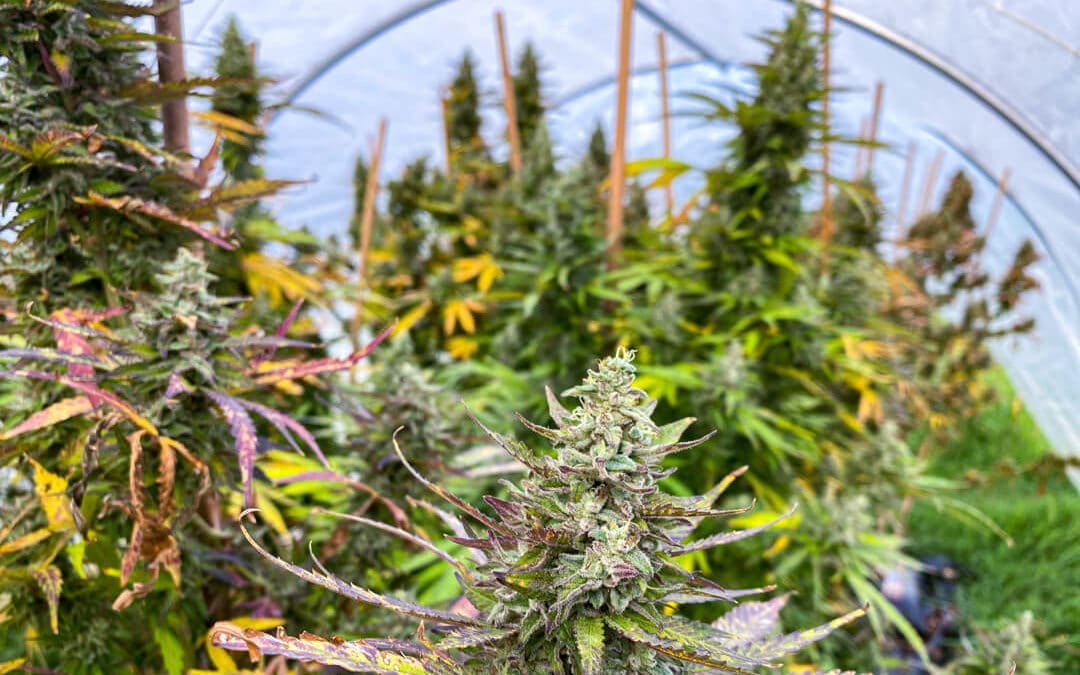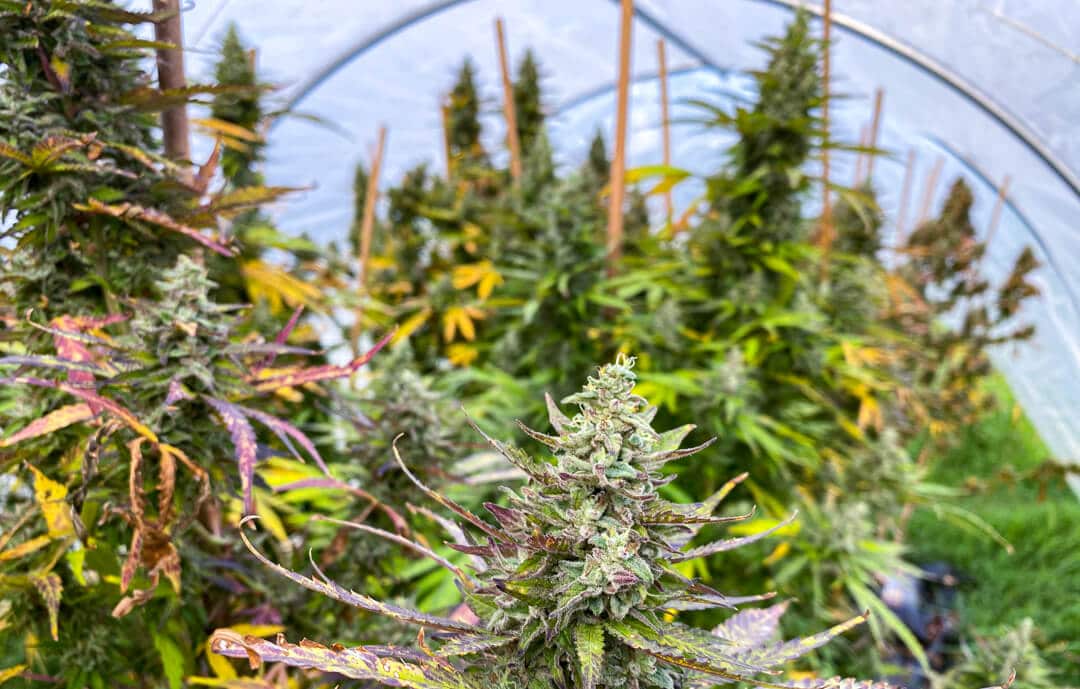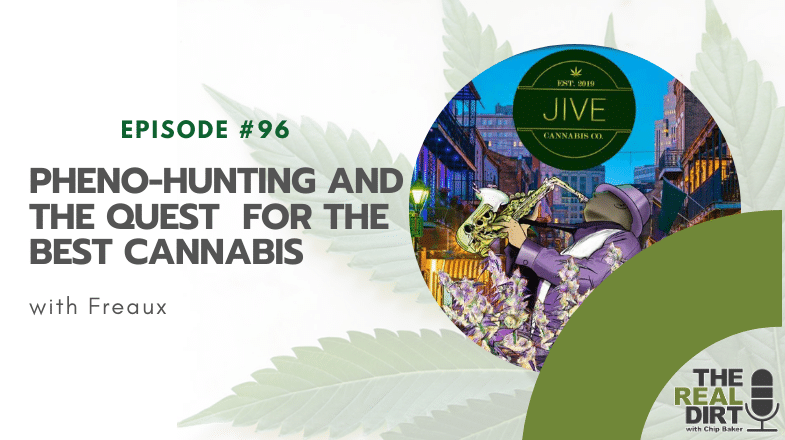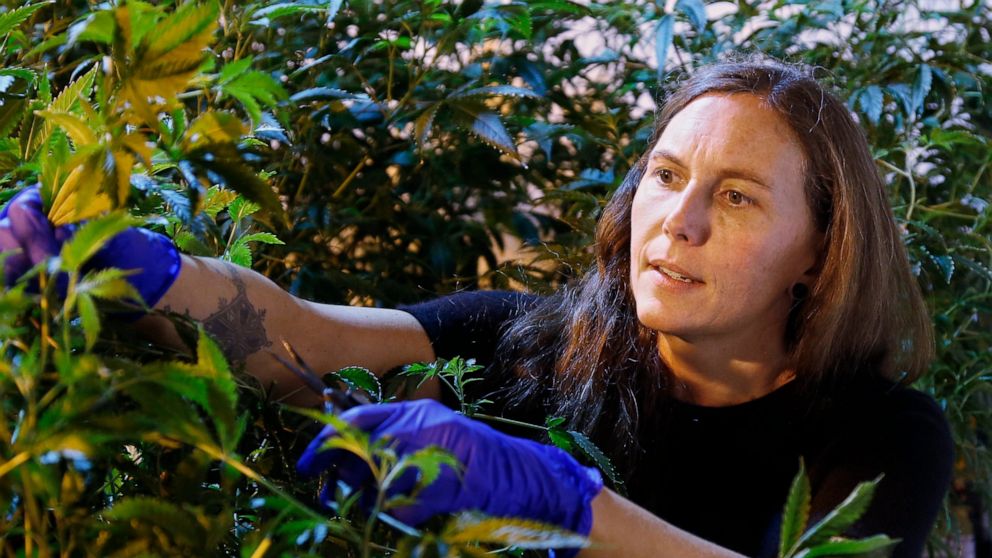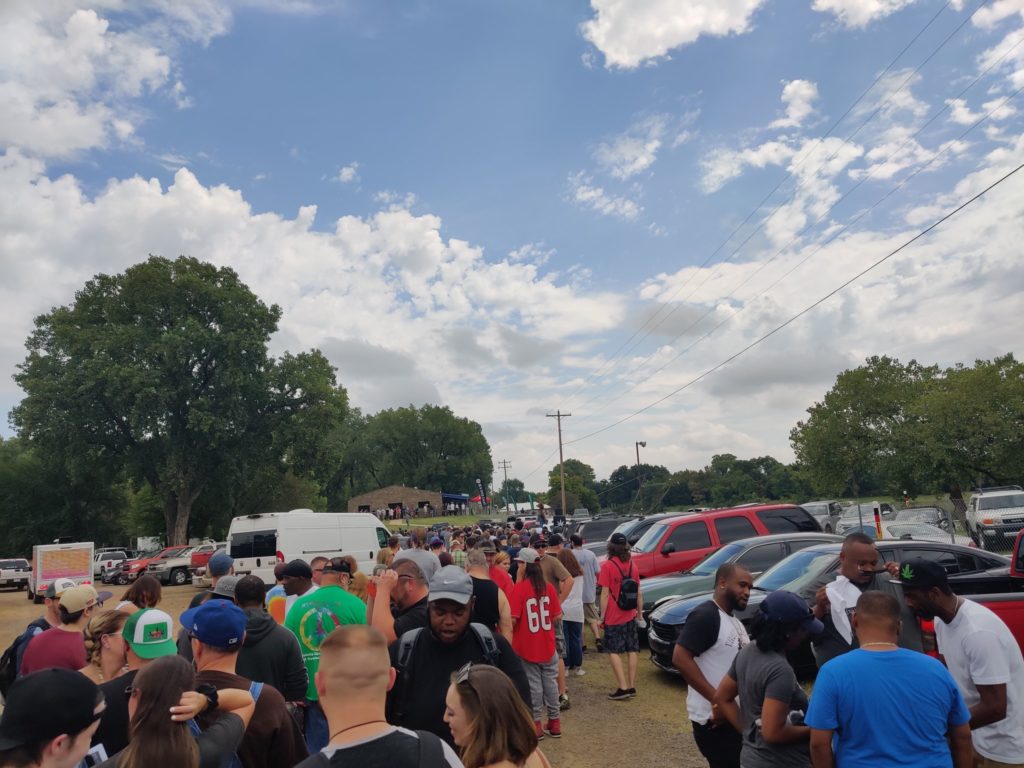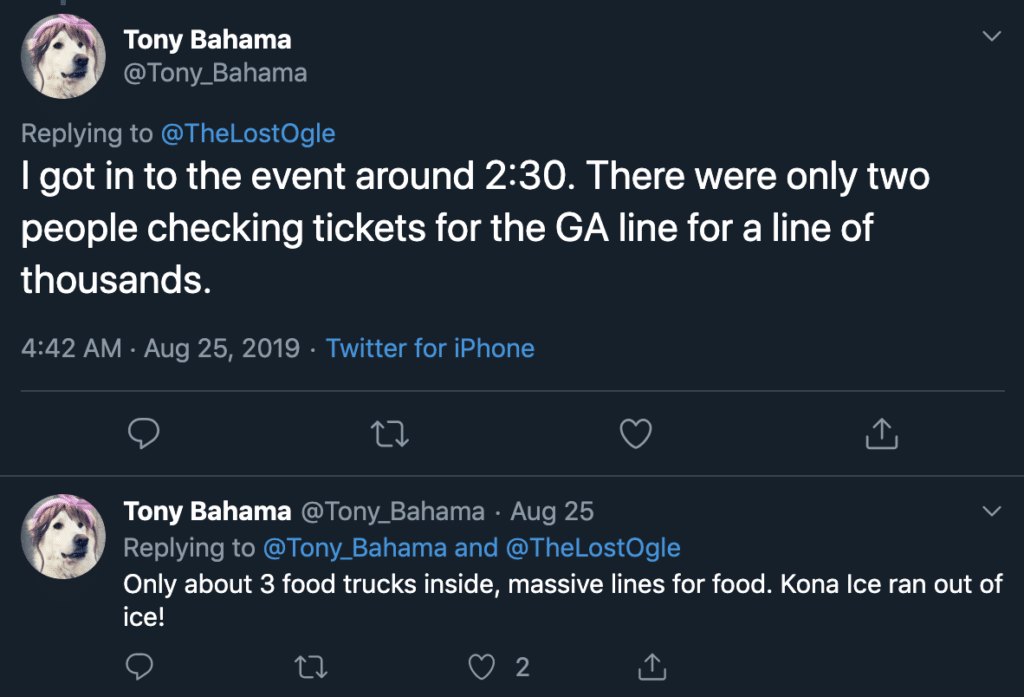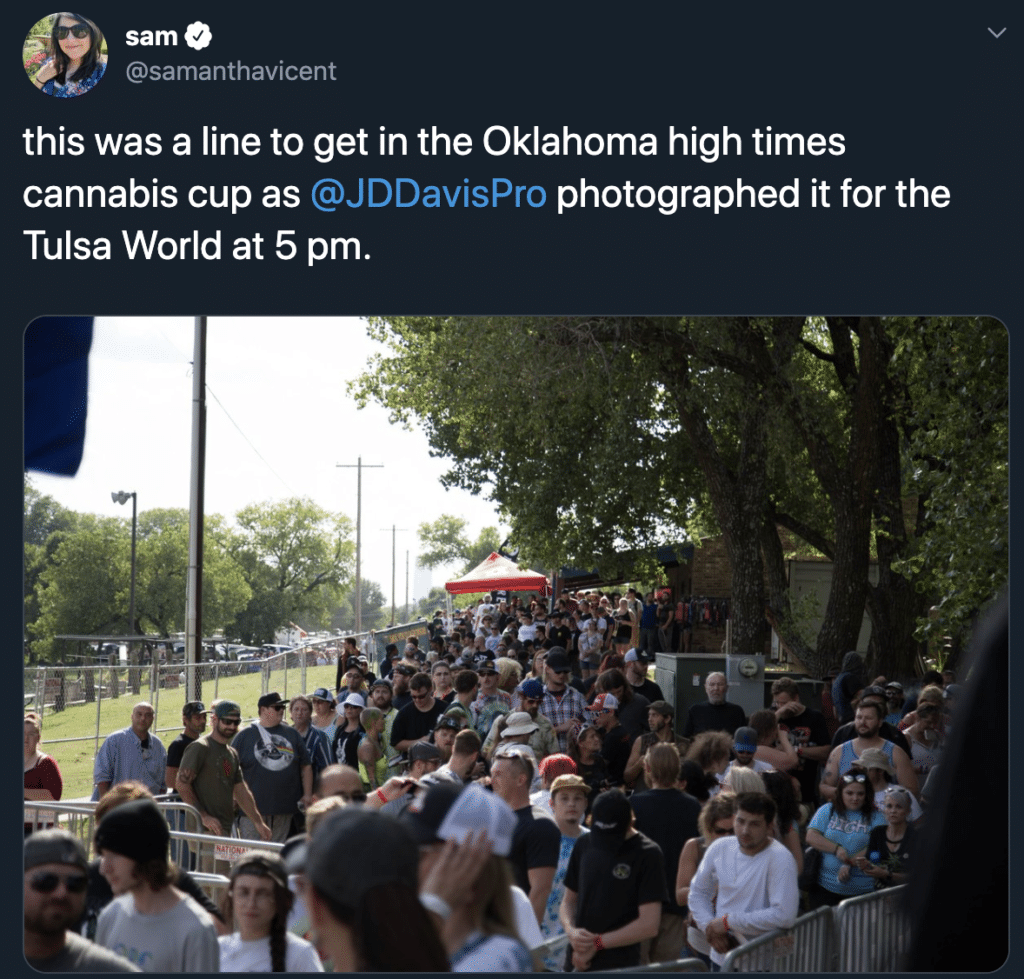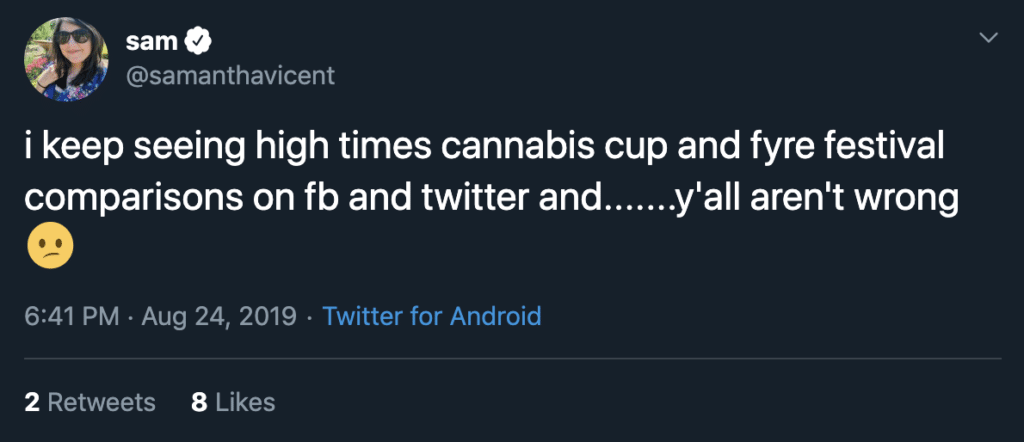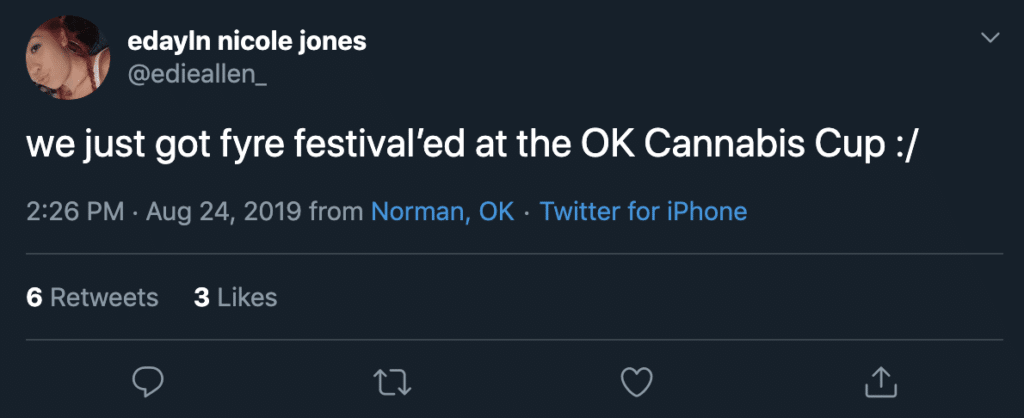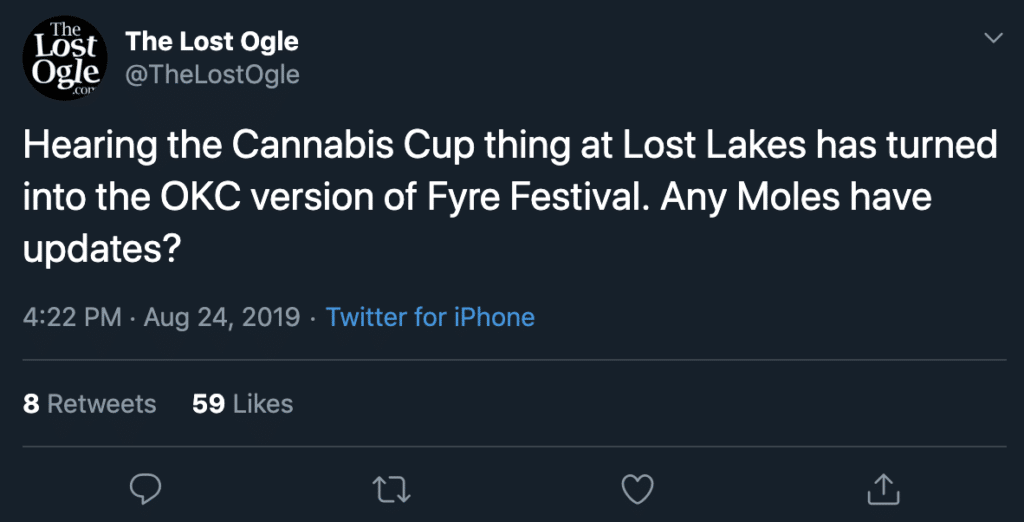![Cancer, Cannabis and Cultivation [ Jim Gerencser Pt. 2 ]](https://therealdirt.com/wp-content/uploads/2020/10/Jimpt2YouTube-Thumbnail-1080x675.png)
Cancer, Cannabis and Cultivation [ Jim Gerencser Pt. 2 ]
Podcast: Play in new window | Embed
Subscribe: Google Podcasts | Spotify | iHeartRadio | Stitcher | Email | TuneIn | RSS
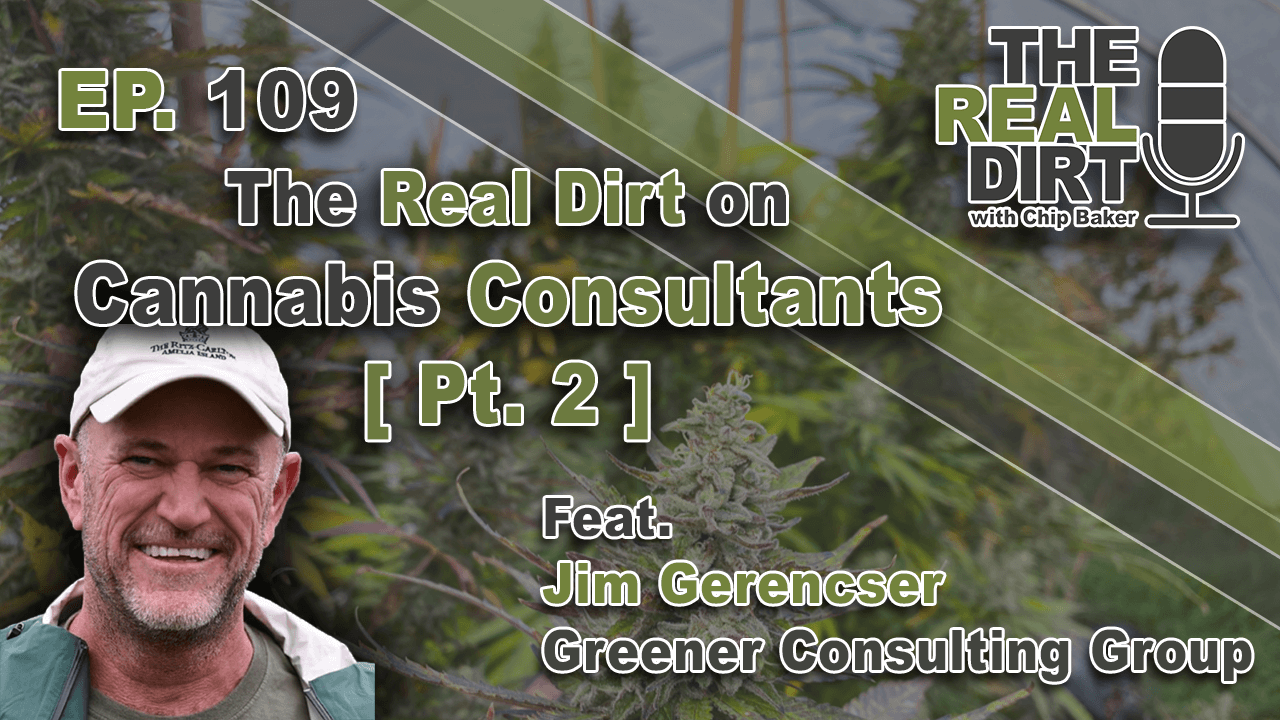
It’s all too common for someone to enter the cannabis industry for personal or medical reasons. Jim Gerencser is one of them.
Jim’s son Eric has had a rough battle with cancer throughout his entire life. From the time he was 8 until he was 18, Eric underwent regular brain scans to determine if the tumor in his brain would end up being fatal. After beating that cancer, another was found in his abdomen, and it was even more serious.
But because they recognized Eric’s condition early, it was easier for doctors to find and eradicate the cancer before it grew to a dangerous level. This victory inspired Jim to create E.R.I.C., also known as Early Recognition Is Critical.
The E.R.I.C. Program aims to educate people about the early recognition signs of various cancers so it can be fought before it spreads. And now Eric himself is a teacher to young students about how to take care of themselves. But cannabis was a major factor.
Eric was on 9 drugs during his Chemotherapy treatments. With the help of legal cannabis oil, Eric was able to cut out 5 of those medications, down to 4 with the help of cannabis. That’s what inspired Jim to enter the cannabis industry.
Jim meets Chip
When Jim needed an expert to help him plan out what he wanted to achieve in the legal cannabis industry, Chip was the first name to come up among his friend and business circles. Once they connected, the rest was history.
If you don’t get the vibe from their conversations, Jim and Chip have become great friends that are working together to change how cannabis consulting works.
In Part 2 of their conversation, Jim and Chip talk about Eric and how E.R.I.C. got its start, how they started working together, the importance of R&D in cannabis cultivation plus some more in depth cannabis talk!
Learn more about Early Recognition Is Critical (E.R.I.C.)
Learn more about Greener Consulting Group
Follow and Subscribe to The Real Dirt Podcast:
Apple Podcasts
Spotify
Get great deals on grow gear:
CultivateColorado.com
Transcript
Chip: And we’re back, Jim.
Jim: Yeah. I love Cultivate.
Chip: Oh man, I got a great crew. Like, if there’s anything that I’m proud of, it is my crew and how they work together, and work with other people, right? I have worked on that and we have cultivated that.
Jim: No pun intended.
Chip: Yeah, I am most proud about that. I’m impressed with my whole crew, man. I’ve got maybe 30 people, not a bad apple among them. Any one of the people would sit down and chat with any of you about cannabis, or sports, or whatever you found common in your life. And they’re not arrogant or ego driven just you know, all really good, good people that support cannabis.
Jim: So the way Chip proposes we’re added as Ganja U in Oklahoma and it’s summer solstice –
Chip: That’s our nickname. That’s our nickname for our cannabis farm out here, Ganja U, because we just keep learning.
Jim: So we’re out there, and we’re out there on the summer solstice and Chip’s whole crew from Cultivate Oklahoma shows up. So, Chip is an amazing, he’s not like a boss. He doesn’t boss people around. He’ll jump in there and do it first. And he’s a leader. So it’s been fun watching how you manage people. Chip. You’re totally a remote kind of guy, but you’re a hands-on person. But you can manage it remote, because you have a good team in place already. So yeah, give Cultivate a call. I’ve met half the crew, looking forward to meet the other half. I highly agree with what he says, he said that it’s a hell of a team. Call him up, man. So especially if you do it yourself, if you want to put together a little package which I’ve done in the past, a lot of times you got to go to three or four different stores. Cultivate will take care of it for you right there. So yeah, good stuff. Hey, the reason I’m into this is like I said –
Chip: Yeah, let’s talk about ERIC. Let’s talk about ERIC.
Jim: ERIC is a cancer prevention charity. I started it back in 2012. And Eric had gone through two brain tumors. One of them was a reoccurrence from a misdiagnosis. We brought him to the doctor when he was eight years old six times, and the doctor basically did everything but get him a CAT scan, calling it sinusitis. And I was bringing him to a buddy of mine, he’s a chiropractor, awesome, Ultimate Frisbee friend. His name is Dr. Scott, big shout out to him. But Dr. Scott was adjusting Eric just to help him feel better. And he said, “Why don’t you go get a CAT scan?” So CAT scan. Thirty minutes later, we’re sitting in the office, Eric’s got a big tumor in his head. It’s almost a golf ball size, because it was misdiagnosed for so long. So long story short, everything was good with that. Ten years later, he got full clearance on his brain tumor. Finally, from the time he was 8 to the time he was 18, he had to have annual scans that would basically be like a death scan. It was like, “Is it coming back or not?” Because we had already seen it come back. So when he was 18, he had full clearance. A month later, he had some weird, something going on with his abdomen, he couldn’t pee, went to the doctor. The poor kid had another type of cancer happening. And so at the age of 18, he goes in and starts chemotherapy. And at that time, I had a friend whose mom was going through Stage IV Non-Hodgkins lymphoma and Eric’s type of cancer he had this time was Non-Hodgkins Stage II. And ended up, her mom passed away the second day of Eric’s chemo. So we were blown away. We were fucked up, and we had no idea what we were gonna do. And we just knew we needed to support Eric, we need to take care of this. My friend’s name is Cassandra. And we needed to take care of Cassandra and Cassandra’s family and ended up starting a charity. And we didn’t know what we wanted to call it. But we knew one thing we wanted to do, was we wanted to make sure that we could introduce cancer symptoms earlier to people, because her mom had Stage IV, Eric had Stage II. Eric was still alive, her mom was not. So, we started coming up with names and I came up with “Early” and “Critical,” and my cousin came up with “Recognition Is.” So we came up with Early Recognition Is Critical based off E-R-I-C. So here we are, eight years later, 2020, ERIC has been teaching kids cancer symptom education. The hardest thing to do is go into schools anymore. So I am taking ERIC out of the youth space, and moving it into the adult space. And I’m going to be focusing on using fully extracted cannabis oil to fight cancer. So this is the official coming out party and I want to thank Chip for allowing me to do it.
Chip: Yeah, man. Let’s fight cancer.
Jim: Let’s do it.
Chip: Hey, ’cause and one of my best friends named Greg, he’s says, “Fuck cancer!”
Jim: Fuck cancer!
Chip: Right, Greg? Greg Davidson.
Jim: Say it out loud.
Chip: Fuck cancer! Alright, one, two three.
Both: Fuck cancer!
Chip: Fuck cancer.
Jim: Yeah, say it again and keep saying it. And don’t be afraid to say the word cancer, because the way to beat it is to add “fuck” to it. Fuck cancer. So, right now we’re officially fighting cancer with cannabis. And if you have any questions call me direct. Hit me up on Facebook. I’m on Facebook, I’m on LinkedIn, I’m on Greener Consulting. You can find me, G-E-R-E-N-C-S-E-R. There’s not many of us around. So yeah, thanks, Chip. It feels good. I’ve had it in the closet for eight years. I’ve been wanting to merge the two forces together. I’ve been doing survivor stories for both sides of it. I’m just out doing survivor stories. So if you’re a survivor, hit us up. Go to our website, early recognition is critical. Tell us your story. Tell us if cannabis helps you save your life, or if it helps make skin cancer go away like it did me. I had a basal cell carcinoma on my arm. I went to a dispensary in Santa Cruz. I also own a professional Ultimate Frisbee team called the Dallas Roughnecks, and we’re big supporters of cannabis curing cancer, to be honest. And I had a spot on my arm and I used fully extracted cannabis oil, they refer to it as FECO oil. This FECO oil dissolved that cancer within two weeks, with no side effects whatsoever, and there’s absolutely no sign of it. So man, I am pumped about this, as you can tell. I’m ready to talk about it. We’re gonna fuck up some cancer. And we’re gonna – it all started right here on The Real Dirt. So there we go.
Chip: So in the past, let’s talk about this early recognition portion of ERIC, and why that’s so important.
Jim: So you know that the key to beating cancer is recognizing it early. I hear that all the time, but nobody really pushes it. If you have Stage IV, what that means is that the cancer has metastasized across your body. And it means that it’s moved from where it originally came in, which would be either your lymph nodes, or some of your more sensitive infected parts of your body, and then it starts spreading. And as it spreads, and if it gets up into your chest, that’s basically Stage IV. And it’s kind of what they used to refer to as a death sentence. Stage I means that they found it exactly where it started, and it’s contained in one specific area where they have multiple different ways to be able to treat it. Like you can do chemo, they can do radiation, they can do surgery. Eric’s Burkitt’s lymphoma, we did surgery, and then they also did chemo. So he went through a surgery, they did the biopsy, and then they also did chemotherapy. But Eric did cannabis the whole time he was doing this, and it allowed him to be able to continue eating. And when Eric came home from the hospital, this is really important. He was given nine prescriptions. And after he used cannabis oil, he was able to eliminate five of those. So a lot of the medicines are all these different –
Jim: Wow man, five out of nine.
Jim: Five, gone, off the list, do not need them anymore. They were basically drugs that were gonna make you feel not nauseated. And then you had to have, you have another pill that would make you feel not nauseated from the pill that makes you feel not nauseated. So that’s just a bunch of crap. And that’s what Health Camp Buddy’s all about. And so recognizing cancer symptoms early, we recognize it because Cassandra’s mom had Stage IV, Eric had Stage II, he’s still alive today. So I just did the math. And I started realizing that we could use Ultimate Frisbee as a way to teach people to speak up. I think “speak up” is our best message. One night, I woke up in the middle of the night. And I was like, “Speak up, tell someone.” And my friend was like, “What the hell’s going on?” I was like, “It’s all about speaking up. You can recognize it early. But if you don’t tell anybody, it’s nothing’s happening. You have to recognize it. And you also have to speak up.” Ultimate Frisbee is a great sport that I have been part of since I was 19. And part of Ultimate that’s cool is you call your own fouls, all the way up to the pro level, they have reps in the pros, but all the way up till that point, you call your own fouls. So you have to speak up. So we use these Ultimate Frisbee clinics, we would go into the schools, and we would work with 5 to 600 kids in one day, which is fun as hell but also tough as hell. And teach them to speak up if something’s wrong with your body. We simplified it down to giving them some really basic symptoms. Eric’s symptoms were headache and vomiting. You can have a headache, and headaches aren’t normal by the way. If you have a headache, something’s wrong. Go to get it checked out, and don’t just accept it as a headache. But then he had vomiting too, which was nausea and actually vomiting. And what was happening was his brain tumor was causing his blood fluid to not be able to drain, and the only way he could get it out was to throw it up. And it was vile basically coming out, and it’s not normal. So that is a cancer symptom. And also not being able to pee. Come on, you should be able to pee. You should be able to go to the number two, you should be able to use the bathroom without it hurting, without it being uncomfortable. So if it’s not, speak up. So that’s my ERIC speech. And like I said, early recognition is critical. That org, I’m really proud of it. It does save lives. I’ve had multiple people call me up saying that they’ve gone to the doctor because of what we’re doing. And they caught their cancer at Stage I. End of story. It works.
Chip: Yeah, that’s dramatic, man. That is absolutely dramatic.
Jim: So yeah, we’re, we’re loving it. And it’s cool. It’s really cool to be able to combine cannabis with it, because I know that that’s where I think I could do the best, do the most damage, save the most lives without pills. It’s kind of a concept I wanted to start, plants over pills. If you ever listened to an article on a commercial for like, anything but Viagra, they tell you all these symptoms. Yeah, you could take this pill for high cholesterol, but you might commit suicide and you’re definitely gonna probably have diarrhea, and you probably won’t sleep at night, and you’re not going to be hungry anymore. But good for you, you don’t have high cholesterol. But there’s other ways to do it. One way is to eat healthy. I’m probably not a great example of that. But –
Chip: We all struggle with that one, that’s for sure. No matter, the most healthy of us still have their issues.
Jim: You’ve helped me out a lot there, Chip. You being a vegetarian definitely has made me aware of it.
Chip: Man, and yet now you got the vegetarian chili going.
Jim: How about that? Yeah.
Chip: Yeah, let’s talk about your vegetarian chili recipe.
Jim: You got to taste it man. So I start off with, I sauté garlic, onions, celery, carrots and bell peppers. And then I put it in a crock pot and add a bunch of beans, and a bunch of tomato sauce, and tomatoes, and a lot of spices, a lot of curcumin, and oleander, and a lot of parsley and paprika in there. And a lot of chili, I love chili pepper. And then I cook it for about three or four hours. And then I take about a quarter of it and I’d mix it up in my little bullet to get the consistency right. But I add a lot of bell peppers. I love jalapenos, basically throw anything I’ve got in the kitchen that’s a vegetable. I’ve had broccoli, I’ve had asparagus. It’s amazing, man. I make it every week. My daughter and wife hate beans, but they love the chili. Little do they know it’s like, 70% beans. So it’s all presentation I guess, right?
Chip: Yeah, totally. Totally, all presentation.
Jim: So what’s your recipe? Give us a recipe.
Chip: Man well, okay, so my cheater recipe is with cans, right? I’ll just say the cheater recipe. Okay, so one can of chopped tomatoes, right? One small thing of tomato paste, two cans of beans of assorted – I like the chili beans that, I get the organic chili beans from our local store, can’t remember what brand it is. But they’ve got a couple of different types of beans in it. Onion, garlic, paprika, chili powder. Here’s where I got a little non-traditional for some people, or maybe so but like man, I put some powdered onion powder in it as well, right? Just like, gives it this boost of flavor. Even though we sauté actual onions. Then I take some oil, I sauté the onions and the garlic all together. Man sometimes I’ll put in like, a vegetarian sausage or impossible burger or something like that. We’ve got some like, mushroom type of burgers too. We’ll like, chop that up a little bit at that point.
Jim: Is it possible that your favorite protein is that [inaudible 13:57]?
Chip: No, no, no, I’m a cheap vegan, Jim, right? And I’m a vegan at heart, because I’m lactose intolerant. But I still like, love cheese pizza, I had it for dinner last night. Yeah. Right. And I’ll eat the cheap shit too, I’m not you know.
Jim: If you’re hungry, you gotta eat.
Chip: I’ll eat it all but like, I eat cheese pizza and I’m lactose intolerant. So like, I have to eat some lactose enzymes and, then I love butter, because I’m from the south and everything’s double butter, double sugar. But I eat fish man, I’m a fisherman. Now that I’m in Oklahoma, we buy fish. When I lived in California, I tried to catch most of my fish. We’ll eat fish like, four times, five times a week.
Jim: What’s your favorite fish?
Chip: You know, I have a few favorite fishes and favorite dish, favorite fish recipes. Black cod, which is a deep water cod. Its texture is just incredible. I think that’s what one of my favorite fish, right? If you get true Blackwater cod –
Jim: Did you use to get that up in Northern California?
Chip: Yeah, yeah, it comes out of Alaska.
Jim: Oh hell yeah.
Chip: And you can get it, you get it all over.
Jim: Do some people call that ling cod?
Chip: Ling cod’s different. And ling cod, they are cod, but you also catch them higher in like, 100 feet of water, 200 feet of water. Where like, the black cod they’re deep. And so the pressure of the water changes the consistency, their consistency, right? Different fish, man. Great, great fish. If you’re ever in Denver, there is great, great sushi in Denver. And I know it’s totally environmentally inappropriate, but farm raised Croatian tuna, the Toro on this stuff is so good. And you can get it in a couple of restaurants in our area. Izakayaden is the one we go to. Otherwise mostly-
Jim: You’re a big sushi guy though.
Chip: I eat sushi for sure. But in Oklahoma, I haven’t really found the sushi spot.
Jim: Yeah, there’s not one.
Chip: I hear there is, actually. But I haven’t gone there yet. I mean, because most of the sushi is flown in overnight. So it’s all about your connection wherever you are. I love shrimp and lobster and crab, Dungeness crab and crab cakes.
Jim: Stonecrab claws.
Chip: Yeah, I’ll eat all of that. I mean, in the north coast up in Trinidad Westhaven like, we could fish for a lot of that stuff. Like the Dungeness crab, a great fishery for that up there. Tuna, cod, salmon. I mean, you go out and catch rockfish, and ling cod limit any single time you want to go out during the fishing season, you’ll probably limit.
Jim: What are we going to get to pass a joint again, man.
Chip: Oh, well, I mean, I quit that a while ago. I don’t, and with the people you hang out with? I don’t know if I can smoke joints with you anymore.
Jim: Oh.
Chip: Jim is frequently trying to pass anybody who will look at him in the eyes a joint.
Jim: That’s a bad habit.
Chip: Compliment, compliment. No, it’s a compliment. I know. Well, I mean, I haven’t really spoke about COVID too terribly much on our podcast. I’ll say plandemic pandemic, it’s a storm in the horizon, and I’m trying to avoid it. I’m also a private pilot, and you see a thunderstorm, you avoid it. And there are limits that you should get to it close to it, there’s a reasonable limit for your plane size. 30 miles, I believe is what they say. That’s what I’m trying to do is just stay healthy, stay away. I’m not sure what all the facts are. I don’t think anyone knows what all the facts are. It just is such a new problem. Every day, people guess something different about it. Now, I just have had to turn my ears off a little bit. When we go into any store in Oklahoma, we mask up like everybody else, pretty much. There’s usually one or two people that don’t. And hey, whether regardless of what you believe, plandemic, pandemic, like I said. I mask up, man. I go in the store. I respect the other people around me, because I don’t want to cause them fear or harm. And it doesn’t have anything to do with being a sheep. It’s all about just respect for your neighbors, respect for your fellow humans, respect for the scenario and situation. right? Like, no conspiracy theory. It’s just, man, it’s just kind of how it is. You got to like, deal with it.
Chip: Yeah, I think it’ll teach us all a lot of like, barriers and the space between each other in general, you know? It’s just like ,respect the boundaries, man. Everybody should have boundary, right? And everybody’s is different. So –
Jim: Have you flown yet?
Jim: You know, I haven’t, man. And that’s amazing, right? I’m a flyer and I have not, I just had a grandkid. He was born March 22nd. Can you believe this? Snoop Dogg for a grandpa? His initials are OG. I don’t think that was intentional. Knowing my son and daughter in law I’m pretty positive, that wasn’t intentional. And I only tried to pull the OG just enough to get the people that know what’s up. But yeah, but I’m proud.
Chip: You are very Snoop Dogg. Do you listen to hip-hop?
Jim: I don’t.
Chip: Do you rap at all? You don’t listen to any, no Snoop Dogg for you?
Jim: No Snoop Dogg, man.
Chip: It’s alright. We’re gonna get you to a Snoop Dogg playlist.
Jim: You saw I have a record player. And I’ve got some rock and roll. I’m a Led Zeppelin, Led Zeppelin freak. I saw Led Zeppelin in 1977 in Fort Worth, Texas.
Chip: God. Wow.
Jim: It was awesome. Holy shit.
Chip: What size venue was that?
Jim: It was like, maybe 17,000. Something like that. Yeah, it was awesome. And my brother stood in line and got in like multiple fights throughout the night, and got tickets. And somehow, my buddy and I got front row, first balcony, center. It was amazing. But I had smoked way too much weed. I think I smoked, I know we rolled like, 90 joints. I actually –
Chip: What were you smoking? What were you smoking, do you remember that?
Jim: Probably, it was good Mexican weed back then. II was always –
Chip: You were in Texas.
Jim: I was in Texas, but I had connections. One of my best friends was a grower even back then. And he ended up growing, going to college at Texas A&M. And then he got a job at Teledyne, it was one of the [inaudible 21:16] out in California. And his job was to go check on the oil rig. So the first thing he did is start big farms by every oil rig. So he was growing killer weed in Southern California back in I think, ’81. So we were smoking Mexican weed, but we smoked 90 joints, man. And I ended up getting in trouble at football because like, I ended up having to quit football, because of the penalty that they put on me. Texas football. I missed one day of practice. Yeah. Now, granted, we did get caught –
Chip: You gave up your football career to go to Led Zeppelin. Hey man, you had your priorities straight, bro. That was the smartest decision you ever made. If you have not done that, that would have shaped your life forever, and you wouldn’t have been who you are.
Jim: I would have been three –
Chip: You chose, oh, dude, you chose an experience that, you have told this experience 1000 a million times. It’s probably one of the most important things that’s ever happened to you.
Jim: Yeah. It’s something that many people have done.
Chip: That’s life, right? That’s how it turns, man.
Jim: That’s what it’s about. It’s not about how much money you have in the bank, it’s how many stories and memories that you have. My lifestyle’s kind of based on time rich, we’re actually doing a movie. It’s called The Ultimate Charity. And it’s all about ERIC, and how we got so many eyes on ERIC so quick. And we started the ultimate frisbee team and they ended up winning the championship in 2016. And we went all over the world. I mean, ERIC’s actually right now in Colombia, Venezuela, Slovakia, Hungary, Germany, Italy. It’s all over the world, man. I’ve done an amazing job of blowing it up and not really even knowing it. And I think it’s just organic. I just kind of got out of the way, and started something really cool and run with it. So good stuff, Chip. This has been awesome, man.
Chip: No, no, no, man. It’s great, dude. I’m glad we’ve been talking about this for a minute. And I want to do some other podcasts with you, too. Here’s the three podcasts, you guys. Here’s what me and Jim are going to do in the future. We’ve been talking about this for a minute, because we both really love business, and I analyze my business, and other people’s business, and help my friends with their businesses all the time. And we’re gonna analyze some sort of cannabis business on a podcast here soon, right? Yeah, totally, totally. And man, I started when I was young, Jim started when he was young. I’ve been doing this like, I’m 47 right now, Jim’s 65. Like we’ve been doing this ever –
Jim: 60.
Chip: 60. Hey, I was trying to give you more experience, bro. Not call you older. So you still can’t get the discount, then
Jim: Oh, no people are discounted at 55 now, man.
Chip: Oh, okay, good. Let’s go to Ryan’s and get some food.
Jim: That’s terrific. Hey Chip, that’s a freaking great idea.
Chip: It’s a great idea, though, isn’t it? Yes, I should do that. Because we just both love to do that. That’s such a fun thing for us to do. People will learn about it. We’ll go over a whole PL, BL, we’ll just pick a cannabis business.
Jim: Yeah. And if you want us to do your business, why don’t you send it in? We’ll start a little application process.
Chip: Yeah, absolutely. That’s what we’ll do. If you have a cannabusiness with a PL BL, it doesn’t even have to be a current one. It could be last year’s. We need this. We need you to be sure of your numbers. We need, you’d have three years of these numbers. And you’d be willing to get on podcast with us and talk about it. And I mean, it’s simple. We’ve been in business for three years and been running some sort of financial management software. We use QuickBooks but whatever we’ll generate a PL and a BL for three years straight, so we can actually see what the business has been doing, and generate some good conversation. It’ll be fun. I really love to do this. I know businesspeople like, “Oh, PL, BL. No.”
Jim: They don’t get it, we can talk –
Chip: They don’t get it dude.
Jim: We’ve done so much that a lot of people would love to hear. I used to do all my own taxes. I wouldn’t do them, I wouldn’t have my account layout five different scenarios of different cash flows, and different ways to spend money on some things. And we can all talk about a lot of fun things, and honestly, we could bring some specialists on. I’ve got a guy that’s a tax guy. Or we could bring in a, you know, specifically based off of what kind of company it is. Yeah, I love it.
Chip: That sounds fun, man. We’ll do that. It’ll be a Greener Group Excess episode, we’ll start doing that.
Jim: Did you just think of that?
Chip: It just came off. We’ve been talking about similar stuff. But like, I mean, we talk about it all the time. I mean, I deal with PL BL all the time. It’s how I run all of my businesses. And if you’re not running a profit and loss statement, or a balance and ledger statement on a monthly basis reconciling them, then you’re really missing out on understanding how your business works and being able to see where you can go with cash flow, where you can go with tax –
Jim: How to anticipate things yeah, how to save money on tax. I’m a specialist at that. I understand cash flow. I understand cash basis versus accrual basis. I’ve converted, I think Jeff and I both have just recently converted from cash to accrual. That’s a big thing. It happens only if you hit a certain revenue amount, the IRS requires you to do it. Been there, done that. I survived, so we do it. I’ve started businesses left and right. Chip has had great exits. Hey, let’s schedule that in. I’d look forward to-
Chip: Yeah, man. We’ll have to schedule that in. Hey, let’s find somebody though. Hey, we’re reaching out. Any type of cannabis business, it doesn’t matter what you’re doing. From if you’re a class one or class three, if you’re a dispensary or an attorney, if you’re an ancillary company selling products to the cannabis industry, or if you’re in the cannabis industry extraction to hemp, anybody’s peel. But you have to have three years’ worth of reconcile, balance, ledgers, and profit, and loss statements.
Jim: Hey, it’d be awesome if you have like an idea of where you wanted to go too. Like, what we’re trying to help you with? Are you wanting to scale? Or you want to sell? Are you wanting to make more profit? Are you wanting to like, give us some ideas? And basically, we’ll suggest for you, but come up with an idea. Bring your company to the table. We’ll come up with the name of this probably next time we talk and smoke one.
Chip: This is great. This is great, dude. I’m loving it. We might we got a whole ‘nother like, this is literally like, both of our like, I shouldn’t say hobbies, but we get excited about it.
Jim: It is. I know [inaudible 28:21]. Do we not have anything else better to do than this?
Chip: Yes. Like, I’m gonna find the 1%, I’m gonna find 1%. That’s often my motto is like, stack up the 1%, man and get 1% profit coming out of it.
Jim: I’m always better helping other people than helping myself. I hate to say that. I don’t know what you call that. But it is what it is.
Chip: Yeah, I’m similar.
Jim: I think it’s called just giving. You know, when you’re a giver, you want to help other people, it’s almost a codependency. You want to help other people more than you want to help yourself. Even on the airplane, they tell you if we’re going down, put your own mask on first, that way you can help more people. It’s a good point.
Chip: It is a good point.
Jim: But we’ve already done that, Chip. I think we both have our mask on already, you know what I mean? We’re very comfortable with each other and we’ve never brought up money. It’s never been like, it’s not like, we have to make money or we’re, I’m broke I need I’ve got – because money is one of those things. If you have too much or too little, you’re in trouble. There’s somewhere in between there that you’re comfortable. And I think both of us are comfortable. I think we’re comfortable in our skin. And a lot of times skin is green. It’s how much passion.
Chip: Hey man, I spend all my money on weed and I always have, and I’ll probably always will. Any of my friends out there listening to me know what I mean about that. I’m either gonna invest it all into more businesses that are weed associated, hire more employees and I do whatever I want, but like I also work 10 hours a day.
Jim: So Chip I used to always say back in the day it’s like, all my friends would say, “Why do you have weed?” I was like, “I always buy enough so I don’t run out.” And I always referenced, I could always turn weed into money, but I cannot always turn money into weed.
Chip: Money into weed. That is very freak brother quote right there. Hey, let’s talk about weed, Jim. You were smoking some Humboldt, what do you mean by that? Is it indoor? It’s indoor?
Jim: Yeah, indoor. I’m a big fan of indoor. Honestly, I got some fresh outdoor but in this greenhouse, but I guess I’ve learned from Chip, greenhouse weed is outdoor. I’m just not a fan of –
Chip: Even though they might call it indoor.
Jim: They might, yeah. That’s the thing about the industry is we’re all outlaws and some people don’t care that much. So some people just make shit up and yes, but other people are really concerned about it. The genetics is really, so I’m a big fan of indoor. I like the flavor. I do a maintenance process. I smoke a lot of just, a couple hits here, a couple of hit there throughout the day, all day. And it allows me to relax. I don’t have to do any ADHD pills. I use cannabis to manage that. It’s called self-medication. And I’m a big, I have my medical cannabis card in California. So I’m legal. So if anybody’s wondering, I believe that this medical cannabis deal is a beautiful thing. I think there’s, how many states are legal right now, Chip? 33 or…?
Chip: I mean, there’s more legal than not right now.
Jim: We should celebration of like, a special little song. [inaudible 31:40] a cannabis song.
Chip: Smoking weed makes me feel fine. Legalize another state.
Jim: You gotta put an auto button for sure. Give your host a stop button too.
Chip: Like a hook.
Jim: What are you smoking, man? What are you smoking?
Chip: I’m smoking right now, I’m fixing to roll up some Kush 19. It’s from our light depth here in Oklahoma.
Jim: Hey, so one of our customers, we were meeting them, they hadn’t bought the business yet. I was looking at investing in it. We all took a break and we all rolled joints up. But Chip made a comment. Remember that you made a comment that, “Hey, this weed is from a buddy of mine.” Right? And the investor said, he told me off record, “I will never invest in somebody that doesn’t smoke their own – ”
Chip: Smoke their own weed.
Jim: It was a really funny statement. So that’s kind of what we’re dealing with here, this guy –
Chip: They’re nice people. They just didn’t understand what was going on.
Jim: They did not get it.
Chip: Like hey, Chip’s looking for the best weed in the world. He’s not ever gonna buy any of that shit. I was coming to see Jim, so I looked for the best weed I could find. And because man, I don’t have it all the time. And even though I’m smoking our own cultivated weed right now, in the other room I also have some variety of weed from [inaudible 33:26] Genetics, a local Oklahoma company. Man, I love their Grandpa’s Breath and their [inaudible 33:28], big up the jive. If you’re in Oklahoma, look for them at your local dispensary or come to Bakers Medical and ask for it there. They have great weed.
Chip: I smoked it. I’ve smoked it for sure. Yeah, I just smoked a couple hits of that outdoor. The thing about indoor, it seems like the whole joint, you can taste the flavor of it. I guess is that’s the terpenes that you’re tasting or what is it?
Chip: Oh, Jim. Man, you just got to get good outdoor, dude. It is the full flavor, like that really good, greenhouse, organic grown outdoor. That’s the flavor all the way down? Oh my god dude, it’s just so good, right?
Jim: Prove it.
Chip: Hey, I’ll tell you what, I got terpene tests that say that my outdoor here and my greenhouse does prove it. And it is higher than terpene test from indoors of the same strains, right? So we actually do have that proof. Man, the extract –
Jim: What causes that? Does the heat bring up, do you think the heat causes, creates a –
Chip: Man, especially in the greenhouse, it’s in this natural environment that’s still protected, right? And part of the terpenes and the secondary compounds are to like, fly off the plant and either act as an attractant, or repel pests, or be a memory to an animal that eats it. Right? It’s like, “Oh, don’t go near that funny smell and skunk weed, because we got high as fuck last time, we’ve had to eat the seeds out of it.” Right, that’s the initial purpose of it all. But then like, we’ve like, “Oh, I like the myrcene, I like the limonene, and breed that in there. And select for that. And that’s what we, as humans have done to increase it. So in a greenhouse, they’re contained, and they don’t blow off so much, but they still get the natural sun. But then you use a UV resistant plastic on top of it, that that pulls out a bunch of the UV. And that whole accumulation of things, I believe makes greenhouse weed have the highest terpene. I mean, I’m not the only person saying it. I’m pretty sure it’s already been proven. Now, you cannot, you can get the worst terpene profile out of bad greenhouse operations, or bad genetics, right? ‘Cause that happens too.
Jim: Okay, well I have to be more openminded. I’ll see –
Chip: Hey, man, I’m not claiming to have great weed right now. And, we’ve been growing our outdoor for extraction. We’ve just pulled some, light depth is pretty good. But I’m just gonna say it’s pretty good. I got a high opinion of it all. And man, it was real rough here this year. It was wet, it was humid. At almost every harvest period we had throughout the summer, because we had multiple ones, whether it was auto flowers light depths, traditionally powered outdoor, it’s just been so wet, man. And –
Jim: What you’re doing is people don’t, and a lot of people probably understand, that is much R&D that you do.
Chip: Oh, it’s all R&D. Oh, yeah, totally. It’s all R&D. And that’s the beauty of Oklahoma is that we man, I mean, we’ve grown so many different weeds. Five or six different techniques, greenhouse, outdoor, clones of seeds, light depth, late season planting. I mean, we’ve planted 20,000 seeds this past year, kill off a bunch of seeds, threw a bunch of stuff away, extracted it all. And the point was, we’re looking for genetics that thrive here in Oklahoma, under several conditions. Light depth, early planting, light planting, full season, indoor, and that’s kind of part of it all. It’s just like, I am absolutely a shotgun approach guy to it, and just plant out shit ton as much as you can in Oklahoma. I’ve never been able to plant out this much. So we planted out more than we could control. Man, we’ve seen some great, great, great, great returns out of it. We’ve had some plants that didn’t survive at all. We had some auto flowers that didn’t work out at all. We had some auto flowers that worked out great. We’ve planted every single month, March, April, May, June, July, August, September. And it really, really learned a lot about what’s going on here.
Jim: Bring up a couple of like, a couple of the obstacles that you did and how you pivoted, maybe an example of how –
Chip: Well man, I’ll tell you that the biggest obstacle we had this year was material supply early in the season. COVID had hit in March, everything was fucking crazy. Looking back and oh it was just nuts, man. We’re gonna be feeling that PTSD for years. But couldn’t get materials, couldn’t get supplies. Everybody was weeks out of stuff. And so we had planned on putting 40,000 square feet of hoop, right? We got to 19,000 and I just couldn’t put up anymore. We had been delayed because of, and we had started in February putting this stuff up. We had a hard time getting employees, man. We had a hard time getting farmworkers. We had about 12 different people come out and the heat just crushed them. Because man, if you’re not used to working outside, the heat here in Oklahoma will crush you, right? Hands fucking down. And we’re even like, cautious about it all. But still, it’s a hard job, man.
Jim: It’s farming.
Chip: Yeah, it’s farming. We’re at the ranch. We’re not convenient to any of the big cities. We noticed this man, that many people wanted to come out and work, but they had childcare issues, right? Because their kids couldn’t go to school or couldn’t be under the assistance with their grandparents or whatever it normally had been. And we lost, a bunch of people just couldn’t hang with driving an hour or an hour and a half, and like, having to deal with their kids, right? The kids were I don’t know, just kid stuff, dude. Like, “Oh, babysitter didn’t work out. I’m not feeling good. Oh, you know, this, that, the other.” And because everybody’s kids are home, the normal daycare wasn’t working. We had a problem getting employees here. And I had planned on having six employees for 40,000 square feet of hoop, and 20,000 ish, well, 50,000 square feet of outdoor, that was my plan. That’s what we were prepared for. But we could only get two workers trained and kind of up to speed before like, the season started. And at that point, I decided I wasn’t going to build any more greenhouses. We weren’t going to plan all the outdoor, and we went with just I think, 60,000 square feet, 20,000 square feet of outdoor, and then 19,000 square feet of greenhouse. And then we had another 20,000 square feet of shade out. So we just kind of left all that be. And three people, it was still too much for three people to handle. And that’s three people plus Jessica and me, my wife and me, when we could, when we weren’t working our other jobs, or doing podcasts. So labor was really a big, big problem for us this year. And it threw off my plan. And of course looking back on it, I should have done it differently. But I’ve always been able to get employees and get people to work. And usually, they stay for a long time. And it was just, it’s just been difficult this year, man. That’s been the biggest problem for me this year, was employees at the farm.
Jim: Labor. Labor is tough right now, man. We’re dealing with that big time with our companies. Nobody wants to work. The government gave out. It’s really weird because in March –
Chip: Well, it’s more complicated than nobody wants to work, that childcare issues that they deal.
Jim: Yeah. Yeah, it is.
Chip: Like, I’ve literally had employees, because we’re an essential business. We never stopped working Cultivate Colorado, Growers Coco never stopped working. And we’ve had some employees that have had to quit to take care of the kids.
Jim: That’s sad. But it’s not it’s not the worst thing for the kids. The parents can deal with it. But I’ve heard there’s a lot of parents that aren’t dealing with it very well. I mean, I used to do those clinics at these schools. And what they actually did more than I’ve ever done is drink margaritas afterwards. It’s like, holy shit. That’s, it’s hard to be, teaching kids all day every day. And like, we didn’t have to go. We were like, grandparents. We didn’t have to go back the next day. And it was still not easy. But if you got kids, certain kids, I’m sure you don’t get along with everybody. And if you got to go back to the same environment every day, oh my god. More power to the teachers. They don’t make enough money.
Chip: Oh, teachers. That’s the hardest job, man, that one. More power to you, man. It’s changing, this whole thing’s changing education, that’s for sure
Jim: It’s got to be better. We got to get better at – you know what the cool thing about is, Chip? I think we can now we can spread our wings a little better and get the best teachers, and give them the best platform to teach more kids.
Chip: Yeah. Oh, yeah, man.
Jim: That’s what it all is. It’s like fucking, it’s opening up that opportunity. It’s like a, it’s a beautiful thing, really. Sad, but true. We should take advantage of it, because now Zoom, and dude. You called Zoom, I bought Zoom.
Chip: I should have, oh man. That was a good call, wasn’t it?
Jim: Chip, I sold most of mine and kept just 10 shares, but I’ve made so much money on that. And I had 50 shares based off of what you said, I bought it the day you said it. I said, “Wow, that’s it.” And that’s every day, people should have business partners like us. They could brainstorm for 10, 30 minutes, whatever it is, and little shit like that comes up. And so yeah, the idea, I can’t wait for the next podcast, dude. Let’s schedule it. If you got a company that you’re interested in reviewing, be the first company. We could go, we don’t have to name your company. We can keep it generic, neutral. We can [inaudible 44:33]
Chip: Well, you know, there is the thing is people are scared to talk about their numbers, often, right? You can be anonymous. Like, I was thinking about just pulling up one of my businesses from like, five years ago or something. I could probably feel comfortable talking about stuff from way back then.
Jim: We would definitely do it anonymous. I mean, there’s no reason to, and we can even keep the owner’s name –
Chip: Unless you didn’t care. Unless you didn’t care.
Jim: Yeah, maybe you just sold your business and it doesn’t matter. Or there’s something like you’re getting ready to sell it, and you want some help. We’re going to give you free help. I’m going to include my CFO, his name is John Beasley. I call them John 420. Have him help us out, let him evaluate it. And 420 John and I’ve got, we got Erin.
Chip: For all those who love the weed, roll it up and smoke it now.
Jim: This has been really good chip. I hope we can –
Chip: It’s been great man. Thanks for coming on. I know we kind of just started babbling here as soon as we started smoking weed. This Kush 19 is great, man. Oh, it’s a novel kush, it’s 707 Kush seeds that we planted in 2019, sussed it out. This is really great, great kush variant for Oklahoma.
Jim: What’s your dispensary called?
Chip: Bakers Medical. It’s actually my wife’s dispensary. Yep, yep. Wife dispensary, Baker’s medical. She’s there every day, we sell clones.
Jim: And healthcare insurance.
Chip: And yeah, if you want a health care camp shirt, go to Baker’s Medical. This Kush 19 wow, it’s coming soon. This tastes good. It’s not great, though, man. It’s just good.
Jim: Oh it’s just okay?
Chip: It’s just good. I’m not, no, no, no, no, no, it’s good. It’s good. It’s good. It’s good. It might be okay weed, but it’s okay.
Jim: Better than okay?
Chip: No, it is not okay okay. Okay okay? Okay no, okay okay.
Jim: That’s okay good.
Chip: No, this is good. This is okay, good. This is good okay. This is good okay. There we go. Okay okay, good okay, great okay.
Jim: And that’s how it is. Already scheduled for the day.
Chip: Yeah. And man hey, I do have some great okay, dude. This Durbin Thai Highflyer. It’s a strain we grew 15, 20 years ago maybe? We got a cross that in this other seed 99 from Brothers Grimm seeds. Super up. Oh, awesome, awesome, awesome high. “Sativa” high. This Apollo 11 also from him, super, super, got really buzzy, electric weed, man. I know you’re more of the medical medicinal side, but I really love that buzzy electric high man.
Jim: I need to try that more In the morning.
Chip: Yeah, totally. Well, it’s been great having you Jim. Thanks a lot for joining us on The Real Dirt. Give me your contacts, how do people get in contact with you or want to hear more about your story?
Jim: Best way to contact me is jim@timerichcbd.com
Chip: There we go. And you’ve got some LinkedIn?
Jim: LinkedIn, Jim Gerencser. Facebook, private message me. Google Jim Gerencser, you’ll find me.
Chip: You can check his bio out at greenerconsultinggroup.com.
Jim: You’ll get Chip and I right now. At this stage, you get Chip and I, and all the introductory calls. So we’re excited to be talking to everybody. Have a good 420. Good deal, Chip. Awesome job.
Chip: Yeah. Thanks for joining us. If you enjoyed this episode would like to listen to others, download The Real Dirt podcast on iTunes or Spotify. Hey, just subscribe. That’s the best thing that can happen to you and the best thing that can happen to us. But the more that people that listen, the bigger our network grows and the better this whole community gets. So once again, I really enjoyed this episode. I really enjoyed talking to you guys. And if you all do something for me this week, man is give a brother or sister a call randomly if you haven’t talked to them in a while. Give ’em a call. And just tell ’em that you love ’em and you wish you could burn a fat one with them. Thanks, this has been the real joing. Real joint. This is the real joint. This has been The Real Dirt. Thanks again.
Jim: See y’all later. Have a great day. See ya, Chip.
Podcast: Play in new window | Embed
Subscribe: Google Podcasts | Spotify | iHeartRadio | Stitcher | Email | TuneIn | RSS

